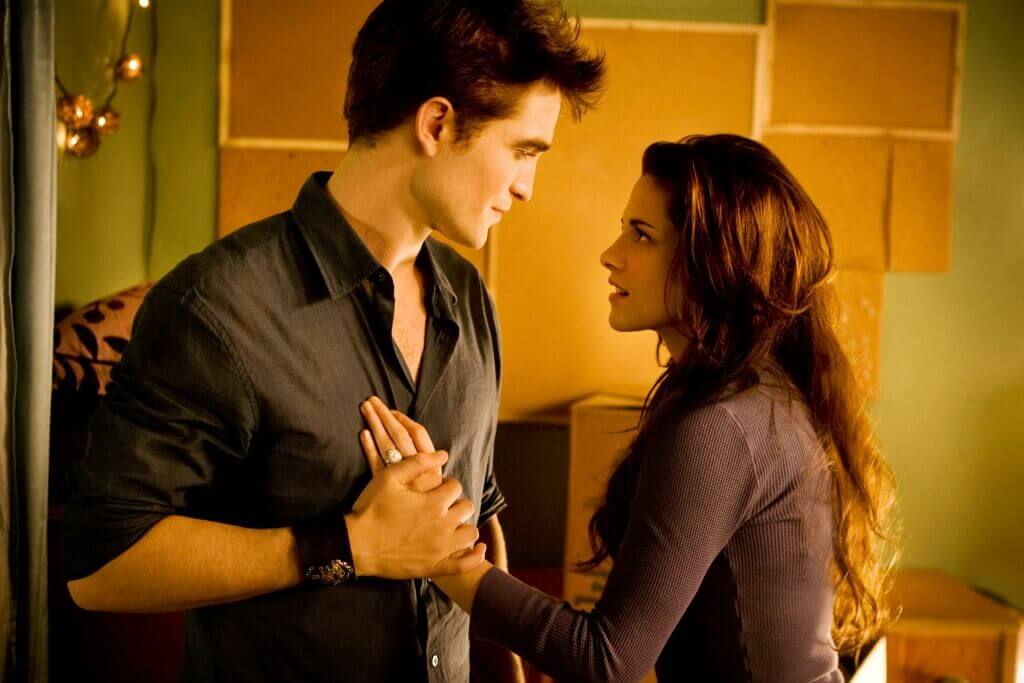I’m almost done with Twilight. No, that’s not true. There’s going to be another movie next year and it’ll start again, but for now I’m almost done.
But I’ve been reading a few reviews and they’re just annoying. I mean, there’s definitely room for controversy with this story. But these harp on what they think are obvious feminist issues, without showing any real understanding of the material.
The two that set me off, each in their own way, are the EW review and a LA Times article.
EW’s contention is that “marriage feels like a life sentence, weddings are miserable events, honeymoon sex is dangerous and leaves a bride covered in bruises, and pregnancy is a torment that leads to death in exchange for birth.”
While I have a dozen arguments with that I’m not really worried about her because a lot of her complaints made me wonder if she even saw the movie (“Bella has the haggard look of a prisoner on her honeymoon” – really? I couldn’t tell with all the dancing and laughing and sex). Also, when one of your complaints revolves around Bella’s shoes for the wedding, which is like a 20 second bit, you just come across as inane.
I only mention it as an excuse to say this: The movie is not saying sex, honeymoon or otherwise, is dangerous. If you really want to hear someone say sex is dangerous, ask Joss Whedon.
Cordelia: I learned something, too. I learned, um, men are evil? Oh, wait. I knew that. I learned that L.A. is full of self-serving phonies. Nope. Had that one down, too. Sex is bad?
Angel: We all knew that.
The LA Times, on the other hand, is concerned that Breaking Dawn might be sending the wrong message: that sex is so special it has to be the sort of affair where only a Brazilian tropical island is worthy of it and (almost-again) that sex has major consequences.
And yet it seems like they’re not even listening to themselves because only two paragraphs previously they understood that, “Keeping the baby is always a lot more dramatically expedient than the alternative, especially when there’s a sequel to be had.”

We want good drama and, good or not, Breaking Dawn has that. Stephanie Meyer gave her hero couple their happily ever after and she needed some conflict to justify the rest of the book. Babies are easy catalysts for conflict, especially this one that changes the dynamic between all of the characters and in the second half the entire vampire culture. So there’s a pregnancy, which is a very real and dramatically useful consequence of sex. And it’s a dangerous pregnancy but women still die in childbirth every year. It’s naive to take for granted that we’re the first culture in history that has sex with little consequence and pregnancy without peril. Bill Condon’s attempt to make it a horror film amplifies these ideas but there’s still a lot less blood in the birth scene than there is in real life.
Women understand blood and pain and danger and acknowledging that isn’t anti-feminist.
I don’t think Stephanie Meyer made these choices for her characters to send a message. I think she did it to tell a story. Which is not to say that stories don’t impact our social consciousness or that we shouldn’t be aware of what stories are saying to us about life and relationships and everything. But it means you can’t ignore the requirements of an author when interpreting that message.
To the LA Times I say, I don’t think she’s saying sex is so hallowed it has to be monumental, but after 3 books *that* sex had better be monumental – Meyer has to deliver something enticing and romantic to live up to her audience’s expectations.
And to EW I say, if you’re worried about Bellas’ bruises you overlooked the part of the story that is actually demeaning. Because after that first night, Edward refuses to have sex again – for her own good. He completely disregards her ability to decide for herself what she wants for her body, or her ability to decide what’s good for her and what isn’t. Meyer tries to portray that he’s being valiant and concerned, but while he respects her body and wants to protect it he does it at the expense of respect for her mind and her will and her intelligence (and, seriously, we all know what I think about Bella’s intelligence).
That would be a interesting discussion to come out of this film while we secretly love it (what?! don’t we all secretly love it?). The thing that Twilight does really well is offer an unironic romantic male lead. And as Time points out, that’s not an unreasonable or anti-feminist fantasy.